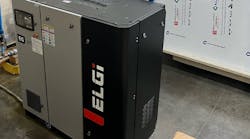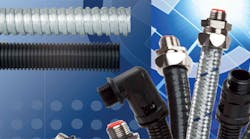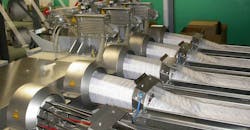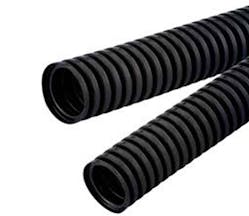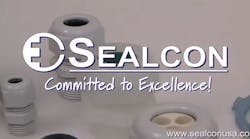You wear gloves to protect your hands and hard hats for your noggin. And you make darn sure you have the right gear on to protect your body and your livelihood. The same consideration should be given to the wiring that powers your machinery and equipment to protect your plant's livelihood, which means you should choose the right conduit for the job.
Just like you'd wear latex gloves when you need a little protection but lots of dexterity and Kevlar gloves for heavy-duty tasks, electrical wiring may need a little or a lot of protection.
Two common options are nylon and galvanized steel. Each has a place on the factory floor, but you want to make sure it's the right place. Here are the advantages of each, along with what industries and applications they work best with:
Nylon
Flexibility
Nylon, a type of polyamide fabric, started out as a replacement for silk; Du Pont, which created the material in 1935, used it for stockings. The riot-inducing slogan of the time says all you need to know about nylon: It has the "strength of steel and the sheerness of cobwebs."
That means it's tougher than the wires it houses, but just as flexible. Nylon conduits are able to wrap around tight turns and stay loose even if connected to rapidly moving and swinging equipment or robots.
Liquid Tight
Nylon fibers are non-absorbent, so they can be used in hose-down and splash applications. Sealcon says their Poleon Nylon conduits are popular with car washes because they can withstand the rigors of splash from water, foam, and wax while moving back and forth multiple cycles a day.
Quick Installation
The good news for electricians and installers is that some polyamide conduits can come with pre-cut slits in them making them easier to replace if damaged. So you just wrap the conduit around the wires like a watch, as opposed to feeding the cables through.
Where To Use
Because of their natural ability to go with the cable flow, while standing up to occasional liquid splash, nylon conduits work great in food and beverage packaging and material handling operations, such as palletizing systems and scissor lifts, says Sasha Dudnikoff, conduit product manager for Sealcon.
Two additional reasons to use nylon: They are cheaper and non-conductive.
Galvanized Steel
That's why Sasha Dudnikoff, Sealcon product manager, says galvanized steel conduits are the perfect fit for plastic manufacturers.
"You have a lot of moving parts with those molds, but also, you have hot plastics moving through and there might be some splash," she says.
Snag Resistant
As we said at the beginning, the main reason to use conduits is to protect your factory floor. Most important of all, though, is protecting the people walking that floor. For that reason, Sealcon's Meleon line includes the Pro A, which features a smooth PVC coating to prevent snags.
Sealcon says the smooth surface of the conduit makes it less prone to catching on items such as clothing or items being moved around the factory floor. Damage to cables is expensive, the company explains, and this smooth coating allows objects to glide over the surface if they come into contact with the conduit, rather than being caught on the ribbed surface.
Where to use: The toughest industrial industries, including machinery, steel processing, smelting operations, and military applications.
For more information on conduit options, please visit: www.sealconusa.com/products/conduit-systems/







